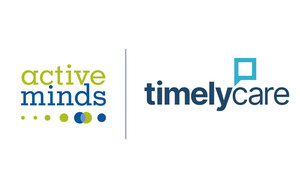Report shows a greater proportion of Asian, Black and Multiracial undergraduate students utilized a fully virtual mental health care model than expected based on institutional demographics
FORT WORTH, Texas, June 4, 2024 /PRNewswire/ -- The Journal of Racial and Ethnic Health Disparities has published an original research article that is the first of its kind to demonstrate how virtual care can significantly enhance access to mental health care among college students across racial and ethnic groups. The peer-reviewed paper is based on findings from TimelyCare, higher education's most trusted virtual health and well-being provider.
Analysis of data from 113 colleges and universities revealed a notable trend: Asian, Black, and Multiracial undergraduates accessed fully virtual mental health services at a higher rate than would be expected based on the demographics of these institutions.
Given that prior research demonstrates that access to traditional mental health services has historically been lowest among Asian and Black college students, these findings underscore how 24/7 virtual care addresses and breaks down barriers to traditional mental health care among these populations, such as stigma, lack of access, limited hours and cost. Increasing access for these historically underserved populations ultimately results in a more equitable distribution of mental health resources.
The research utilized data spanning from August 1, 2022, to July 31, 2023, and compared the demographics of two groups—the total student body of 113 institutions who partnered with TimelyCare, drawn from publicly available Integrated Postsecondary Education Data System (IPEDS) data, and patients who utilized TimelyCare services from the same set of schools. Results indicated that undergraduates access virtual care sessions, including on-demand emotional support, scheduled virtual therapy, and psychiatry services, at rates that do not match the overall demographics of their institutions.
"This groundbreaking study demonstrates how our virtual model of mental health care could eliminate some racial and ethnic health disparities, delivering upon TimelyCare's commitment to delivering exceptional care your campus community can trust," said Bob Booth, MD, Chief Care Officer of TimelyCare. "Without physical barriers, virtual mental health care can offer a more diverse provider network, more flexible hours, and more privacy to meet the unique requirements of students needing support services."
Additionally, the study compared the racial/ethnic composition of students engaging with TimelyCare's virtual care model to those utilizing in-person on-campus mental health services, as reported by the Center for Collegiate Mental Health. This comparison – the first in the higher education sector – revealed a more diverse patient population in the virtual care model, with a higher proportion of TimelyCare visits held with Asian, Black, Hispanic/Latinx, Islander, Multiracial, and Native students. TimelyCare's notably diverse provider network, more than half of whom identify as people of color, may drive some of these findings, giving Asian, Black, and Multiracial students access to providers of the same backgrounds may reduce cultural stigma around therapy.
"Representation in healthcare matters, and our comparison suggests that our fully virtual model effectively addresses some of the obstacles that may still exist in traditional on-campus care," said Nassim Bickham, LMFT, Vice President of Care Transformation at TimelyCare. "This is particularly important information for removing barriers to mental health care so students can stay enrolled and complete their course of study."
According to the 2024 Lumina-Gallup State of Higher Education Study, one in three currently enrolled college students have considered dropping out in the last six months, with emotional stress and mental health being the top two reasons. Black and Hispanic students were more likely than White peers to say they thought about withdrawing from their program, with more than half citing emotional stress as the primary driver and mental health a close second. A 2023 Inside Higher Ed survey found that nearly six in 10 (58%) of students who have experienced chronic stress during college haven't accessed any of the mental health resources through their college or university, though the TimelyCare data suggests that access to teletherapy and virtual care opens doors for more students who haven't historically sought support.
The TimelyCare research team behind "Racial/Ethnic Trends in Virtual Mental Health Care Utilization among Undergraduate Students: A Descriptive Study" includes Dorothy Loren, PhD; Tracy Reuter, PhD; Nassim Bickham, LMFT; and Bob Booth, MD.
About TimelyCare
TimelyCare is higher education's most trusted virtual health and well-being provider, with a mission to foster student success and improve the health and well-being of campus communities. Founded in 2017, TimelyCare now serves 2.3+ million students, educators and staff at more than 350 campuses nationwide. Its comprehensive suite of services – including mental health counseling, on-demand emotional support, medical care, psychiatric care, health coaching, student success coaching, basic needs assistance, faculty and staff guidance, peer support and self-guided wellness tools – expands the breadth of school resources and empowers students, educators, and staff to be well and thrive in all aspects of their lives.
SOURCE TimelyCare







Share this article